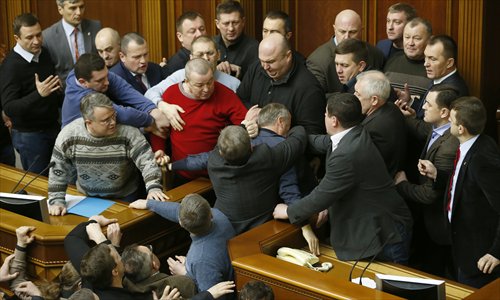HOME >> WORLD
Ukraine to see early presidential elections as part of EU-mediated deal
Source:Reuters Published: 2014-2-22 0:43:01

Ukrainian lawmakers clash during a Parliament session in Kiev on Friday. Photo: AFP
Ukraine opposition leaders signed an EU-mediated peace deal with President Viktor Yanukovych on Friday, aiming to end a violent standoff that has left dozens dead and opening the way for an early presidential election this year.Yanukovych - under pressure to quit from the mass demonstrations in Kiev - earlier offered a series of concessions to his pro-European opponents, including a national unity government and constitutional change to reduce his powers, as well as the presidential vote.
German Foreign Minister Frank-Walter Steinmeier said the deal provided for the creation of a national unity government and an early presidential election this year, although no date had been set. The vote had been due in March 2015.
One of the European Union mediators, Polish Foreign Minister Radoslaw Sikorski, described the agreement as a "good compromise for Ukraine." In a post on Twitter, he said it "gives peace a chance. Opens the way for reform and to Europe."
With Ukraine caught in a geopolitical tug-of-war between Russia and the EU, at least 77 people have been killed this week in the worst violence since the independent country emerged from the wreckage of the Soviet Union in 1991.
"There are no steps that we should not take to restore peace in Ukraine," Yanukovych said when announcing his concessions before the deal was signed. "I announce that I am initiating early elections."
Yanukovych said Ukraine would revert to a previous constitution under which parliament had greater control over the make-up of the government, including the prime minister.
"I am also starting the process of a return to the 2004 constitution with a rebalancing of powers toward a parliamentary republic," he said. "I call for the start of procedures for forming a government of national unity."
Ukraine's parliament later in the day voted heavily in favor of returning to the constitution of 2004.
Earlier, a Polish foreign ministry spokesman said a council of protesters occupying Kiev's Independence Square, which is also known as the Maidan, had backed the agreement.
The German and Polish foreign ministers were in Kiev to promote the political compromise to end the bloodshed amid a stand-off between riot police and anti-government protesters.
Before the deal was signed, armed police briefly entered the parliament building while lawmakers were holding an emergency session but they were quickly ejected, opposition leader Arseny Yatsenyuk said. Members exchanged punches when speaker Volodymyr Rybak tried to adjourn proceedings.
The deal would be a setback for Russian President Vladimir Putin, who has made tying Ukraine into a Moscow-led Eurasian Union a cornerstone of his efforts to reunite as much as possible of the former Soviet Union.
Putin appointed his own envoy Vladimir Lukin to the talks on Thursday. After returning to Moscow on Friday, Lukin said talks to resolve the crisis produced progress, but indicated Moscow had questions about the peace deal and confirmed he did not sign it, Interfax reported.
In another sign of the severity of the crisis, ratings agency Standard & Poor's cut Ukraine's credit rating for the second time in three weeks on Friday, citing the increased risk of default.
Ukraine cancelled a planned issue of five-year Eurobonds worth $2 billion, it told the Irish Stock Exchange where the debt would have been listed. Kiev had hoped Russia would buy the bonds to help it stave off bankruptcy.
On Thursday, EU foreign ministers meeting in Brussels imposed targeted sanctions on Ukraine and threatened more if the authorities failed to restore calm.
Posted in: Europe